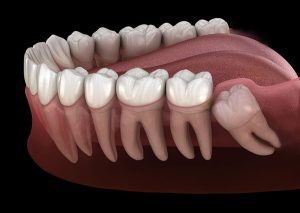When to Remove Your Wisdom Teeth in Luck, WI
Knowing When It’s Time to Remove Wisdom Teeth
Wisdom teeth removal is a common dental procedure, but many people are still unsure when to remove wisdom teeth or why they may need it. With so many questions and concerns surrounding this topic, it’s easy to feel overwhelmed.
Our Luck, WI, dentist, Dr. Morgan Clemenson, is here to help. We’ll explain the signs that point to needing to get your wisdom teeth removed. If you have any questions, or you’re looking to schedule a consultation, contact our dental office today by calling (715) 472-2211.
What Are Wisdom Teeth?

Do I Need My Wisdom Teeth Removed?
Not everyone needs wisdom teeth removal. Healthy wisdom teeth that erupt without issues may only require regular monitoring by your dentist. However, removal is often recommended for:
- Impacted Wisdom Teeth: These teeth are stuck beneath the gum tissue or bone and can cause pain, infection, and damage to surrounding teeth.
- Pain and Discomfort: This includes symptoms like red/swollen gums, jaw pain, and bad breath.
- Inflammation and Infection: Wisdom teeth breaking through gums can inflame the surrounding tissue, potentially leading to cysts and gum disease.
- Tooth Crowding and Damage: Wisdom teeth can cause other teeth to shift, become crowded, or decay.
Types of Impacted Wisdom Teeth

- Vertical Impaction: Unlike a healthy wisdom tooth that would erupt straight up through the gum, a vertically impacted tooth remains stuck despite being positioned correctly.
- Horizontal Impaction: This occurs when a wisdom tooth lies completely sideways within the jawbone, like a flat tooth resting on its side.
- Distal Impaction: In this case, the wisdom tooth is angled towards the back of the mouth when erupting. Imagine the tooth is trying to come in at an angle pointing backward.
- Mesial Impaction: This is the most common type. The wisdom tooth erupts at an angle but angled towards the front of the mouth, pushing against the second molar. Imagine the tooth is trying to come in at an angle pointing forward.
Given the various angles and levels of impaction, consulting with an experienced dentist or oral surgeon in Luck, WI, for an assessment of your wisdom teeth is key to determining the appropriate course of action for your specific case.
Signs You Need Your Wisdom Teeth Extracted
Wisdom teeth don’t always announce their presence with flashing lights and sirens. But there are some telltale signs that they might be causing trouble and need to be extracted. Here’s what to watch out for:
- Pain and Discomfort: This is a common sign of wisdom teeth trying to erupt or causing problems with surrounding teeth. You might experience throbbing pain, tenderness in the gums, or general discomfort in the jaw.
- Swollen or Red Gums: Inflammation and irritation of the gums around the wisdom teeth can cause redness, swelling, and even bleeding. This can be a sign of infection or impaction.
- Difficulty Chewing or Opening Your Mouth: Wisdom teeth pushing against other teeth or causing jaw inflammation can make it difficult to chew comfortably or open your mouth wide.
- Bad Breath or Persistent Taste: Impacted wisdom teeth can trap food particles and bacteria, leading to bad breath and an unpleasant taste in your mouth.
- Jaw Problems: Wisdom teeth can cause pain and stiffness in the jaw joint, making it difficult to open and close your mouth comfortably.
- Tooth Crowding or Misalignment: Wisdom teeth trying to erupt in a crowded jaw can push against other teeth, causing them to shift or become misaligned.
Factors Affecting the Decision to Remove Wisdom Teeth

- Age: Generally, wisdom teeth removal is recommended at a younger age (18-24 years old) when the roots are less developed and healing is faster. However, removal can be done at any age.
- Impaction: Impacted wisdom teeth are more likely to cause problems and are usually recommended for removal.
- Oral Health: Good oral health is crucial before and after wisdom teeth removal to minimize complications.
- Risk of Infection: If a wisdom tooth is causing inflammation or shows signs of infection, removal is typically recommended to prevent further complications.
- Orthodontic Treatment: For patients with braces or other orthodontic work, wisdom teeth removal might be necessary to prevent future misalignment issues or create space for teeth.
- Overall Dental Health: Your dentist will consider your dental health and the potential future risks associated with keeping wisdom teeth.
Ultimately, the decision to remove wisdom teeth will be made based on your situation and in consultation with Dr. Clemenson at our Luck, WI, office.
Frequently Asked Questions
Whether to remove wisdom teeth that aren’t causing issues is a common question. Ultimately, the decision depends on your situation and the dentist’s recommendation. X-rays are crucial for dentists to assess the wisdom teeth’s position and potential for future issues.
Wisdom teeth removal is usually done with anesthesia, so you shouldn’t feel pain during the procedure. Afterward, you might experience mild discomfort, swelling, and soreness for a few days. Pain medication prescribed by your dentist can help manage these symptoms.
Following your dentist’s post-operative instructions (ice packs, pain medication, soft diet) can significantly improve your comfort during recovery.
Yes, different wisdom teeth impactions can affect oral health in varying ways:
- Vertical impaction: These can cause pain, inflammation, and difficulty chewing, but might not always lead to immediate problems.
- Horizontal impaction: This type has a higher risk of infection because the tooth is positioned sideways, making proper cleaning difficult.
- Mesial impaction: This can cause pressure on the second molar in front, leading to pain, damage, or gum disease in that tooth.
- Distal impaction: Similar to mesial impaction, pressure can be placed on surrounding teeth, increasing the risk of decay or gum disease.
The cost of wisdom teeth removal can vary depending on several factors. While the impaction might influence the complexity of the surgery, it’s not always the sole factor affecting cost. Consult with your dentist to get a specific estimate based on your situation and insurance coverage.
Schedule a Consultation with Our Luck, WI, Dentist Today
Do you think your wisdom teeth need to be removed? If so, our experienced dentist in Luck, WI can help! We serve patients in the surrounding areas including Saint Croix Falls, Osceola, Grantsburg, and Amery, WI.
We’ll be happy to schedule an appointment to evaluate your oral health and determine if wisdom tooth extraction is the right course of action for you. Call our Luck dental office today at (715) 472-2211 to schedule a consultation.
